XTB vs XM 2025
In this XTB vs XM Forex broker comparison, we explore the trading platform, cost and account types each broker offers. Knowing these features will help you make a more informed decision on which broker is for you.
Written by Noam Korbl
Updated:
- 67 Forex Brokers reviewed by our expert team
- 50+ years combined forex trading experience
- 14,000+ hours comparing brokers fee + features
- Structured and in-depth evaluation framework
Our broker reviews are reader supported and we may receive payment when you click on a partner site.
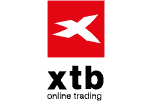

Regulations and Licenses
Brokerage
Markets and Instruments
Minor Pairs 20:1
Minor Pairs 20:1
Minor Pairs 20:1
Minor Pairs 20:1
Minor Pairs 20:1
Minor Pairs 20:1
*Cryptocurrency CFDs are not available to retail traders in the UK due to FCA regulations
*CFD trading is not available in the USA due to NFA and CFTC regulations, American traders spot trade in place of CFDs.
Trading Platforms + Tools
Allowed but not supported
Overall
How Do XM Vs XTB Compare?
Our full comparison covers the 10 most important trading factors, but here are five noticeable differences between XTB and XM:
- XTB offers a wider range of trading instruments than XM.
- XM provides a more diverse selection of account types compared to XTB.
- XTB has more regulators overseeing its operations, giving it a slight edge in regulatory oversight.
- XM has lower minimum deposit requirements, with options starting from $5.
- XTB charges an inactivity fee of $10 per month after 12 months, while XM charges $5 per month after 90 days.
1. Lowest Spreads And Fees: XTB
XTB offers competitive spreads, particularly for EUR/USD and USD/JPY pairs, outperforming ThinkMarkets in this area. ThinkMarkets shines with tighter spreads for GBP/USD, appealing to traders focused on these pairs.
| Standard Account | XTB Spreads | XM Spreads | Industry Spreads |
|---|---|---|---|
| Overall Average | 1.41 | 2.39 | 1.7 |
| EUR/USD | 0.9 | 2 | 1.2 |
| USD/JPY | 1.4 | 2.5 | 1.5 |
| GBP/USD | 1.4 | 1.3 | 1.6 |
| AUD/USD | 1.3 | 2.4 | 1.6 |
| USD/CAD | 1.8 | 2.3 | 1.9 |
| EUR/GBP | 1.4 | 2.4 | 1.5 |
| EUR/JPY | 1.4 | 3.2 | 2.1 |
| AUD/JPY | 1.7 | 3 | 2.3 |
When it comes to trading costs, both XTB and XM offer competitive pricing. You can learn more about Lowest Commission Brokers here.
1. Standard Account Spreads
XTB’s standard account spreads start from 0.35 pips, while XM’s start from 1 pip. Check out this resource on Lowest Spread Forex Brokers.
2. RAW Account Spreads
For RAW accounts, XTB offers spreads starting from 0.1 pips, while XM offers spreads from 0.0 pips. Here’s more information on Zero Spread Accounts.
3. Commission Rates
XTB charges a commission of $4 per lot, while XM does not charge any commission for its standard accounts but does charge $3.5 per lot for its Zero accounts.
4. Deposit & Withdrawal Fees
Both brokers do not charge any deposit or withdrawal fees.
5. Other Fees
XTB charges an inactivity fee of $10 per month after 12 months of inactivity, while XM charges $5 per month after 90 days.
Our Lowest Spreads and Fees Verdict
XTB wins this section due to its lower spreads and commission rates.
*Your capital is at risk ‘72% of retail CFD accounts lose money’
2. Better Trading Platform: XM
Both XTB and XM offer MetaTrader 4 and 5, but they differ in other platform offerings. Here’s a comparison of cTrader vs MT4 and MetaTrader 4 vs MetaTrader 5.
| Trading Platform | XTB | XM |
|---|---|---|
| MetaTrader 4 | Yes | Yes |
| MetaTrader 5 | No | Yes |
| cTrader | No | No |
| TradingView | No | No |
| Copy Trading | No | Yes |
| Proprietary Platform | Yes | Yes |
We have created a software questionnaire if you are unsure what platform best suits your trading style. Based on six simple questions, we can recommend the best trading software for your trading needs.
1. MetaTrader 4 and 5
Both brokers offer MetaTrader 4 and 5, popular platforms known for their advanced charting features.
2. cTrader and TradingView
XTB offers its proprietary xStation 5 platform, which has won awards for its user-friendly design and excellent features. XM does not offer cTrader or TradingView.
3. Social And Copy Trading
XM offers social and copy trading through its MetaTrader platforms, while XTB does not offer these features. You can learn more about the best social trading platforms here.
4. VPS and Other Trading Tools
Both brokers offer VPS services for seamless trading. They also provide various trading tools like economic calendars, market analysis, and educational resources.
Our Better Trading Platform Verdict
XM wins this section due to its social and copy trading features.
*Your capital is at risk ‘71.61% of retail CFD accounts lose money’
3. Superior Accounts And Features: XM
XTB offers three types of accounts: Standard, Pro, and Islamic. XM, on the other hand, offers four types of accounts: Micro, Standard, Ultra Low, and Shares accounts. XM also offers Islamic accounts for each of these account types. You can learn more about Swap Free Islamic Accounts and Best Brokers for Micro Trading here.
| XTB | XM | |
|---|---|---|
| Standard Account | Yes | Yes |
| Raw Account | Yes | Yes |
| Swap Free Account | Yes | Yes |
| Active Traders | No | No |
| Spread Betting (UK) | No | No |
Our Superior Accounts and Features Verdict
XM wins this section due to its wider range of account types.
*Your capital is at risk ‘71.61% of retail CFD accounts lose money’
4. Best Trading Experience And Ease: XTB
When it comes to trading experience and ease, both XTB and XM have their strengths and weaknesses. From our testing, here’s what we found:
- XTB’s user-friendly platform and comprehensive educational resources make it an excellent choice for beginner traders.
- XM, with its wide range of account types, lower trading costs, and social trading features, is great for experienced traders.
- XTB has a slight edge in customer service with its dedicated account manager for professional account holders.
- XM offers social and copy trading through its MetaTrader platforms, while XTB does not offer these features.
In our own testing, we found that XTB’s platform was more intuitive and easier to navigate, making it a better choice for those new to trading. XM, on the other hand, offers a more comprehensive range of tools and features, making it a better choice for more experienced traders.
Our Best Trading Experience and Ease Verdict
XTB offers the best trading experience due to its user-friendly platform and comprehensive educational resources.
*Your capital is at risk ‘72% of retail CFD accounts lose money’
5. Stronger Trust And Regulation: XTB
XTB Trust Score

XM Trust Score

Regulation
XTB is regulated by top-tier regulators, including the Financial Conduct Authority (FCA), the Cyprus Securities and Exchange Commission (CySEC), and the International Financial Services Commission (IFSC). XM, on the other hand, is regulated by the Australian Securities and Investments Commission (ASIC), the FCA, and the IFSC. You can learn more about ASIC Regulated Brokers and FCA Regulated Brokers here.
| XTB | XM | |
|---|---|---|
| Tier 1 Regulation | FCA (UK) CYSEC (Cyprus) | ASIC (Australia) FCA (UK) CYSEC (Cyprus) |
| Tier 2 Regulation | DFSA (Dubai) CMNV (Spain) KNF (Poland) | DFSA (Dubai) |
| Tier 3 Regulation | FSC-BZ | FSC-BZ |
Reviews
As shown below, XTB have a Trustpilot rating of 4.0 out of 5 based on over 2,000 reviews. In contrast, IG Markets has a rating of 3.9 out of 5 based on around 2,600 reviews.

Our Stronger Trust and Regulation Verdict
XTB wins this section due to its regulation by more top-tier authorities.
*Your capital is at risk ‘72% of retail CFD accounts lose money’
6. Most Popular Broker – XM
XM gets searched on Google more than XTB. On average, XM sees around 723,000 branded searches each month, while XTB gets about 368,000 — that’s 49% fewer.
| Country | XTB | XM |
|---|---|---|
| United States | 2,400 | 74,000 |
| Thailand | 2,400 | 74,000 |
| Japan | 390 | 74,000 |
| India | 1,300 | 60,500 |
| South Africa | 390 | 33,100 |
| Malaysia | 320 | 27,100 |
| Indonesia | 320 | 27,100 |
| Egypt | 720 | 22,200 |
| Vietnam | 5,400 | 18,100 |
| Morocco | 1,000 | 18,100 |
| Brazil | 9,900 | 18,100 |
| Colombia | 3,600 | 18,100 |
| France | 18,100 | 14,800 |
| Germany | 12,100 | 14,800 |
| Mexico | 1,900 | 14,800 |
| Pakistan | 210 | 12,100 |
| Philippines | 320 | 12,100 |
| Uzbekistan | 110 | 12,100 |
| Italy | 4,400 | 9,900 |
| Turkey | 480 | 9,900 |
| United Kingdom | 4,400 | 8,100 |
| Algeria | 880 | 8,100 |
| Cambodia | 170 | 6,600 |
| Taiwan | 140 | 5,400 |
| Canada | 720 | 5,400 |
| Spain | 27,100 | 5,400 |
| Kenya | 70 | 5,400 |
| Peru | 2,400 | 5,400 |
| Bangladesh | 110 | 5,400 |
| Singapore | 140 | 4,400 |
| Saudi Arabia | 1,000 | 4,400 |
| Netherlands | 1,600 | 4,400 |
| Nigeria | 480 | 4,400 |
| Sri Lanka | 90 | 4,400 |
| Ecuador | 880 | 4,400 |
| United Arab Emirates | 1,900 | 3,600 |
| Poland | 135,000 | 3,600 |
| Australia | 320 | 2,900 |
| Greece | 210 | 2,900 |
| Chile | 5,400 | 2,900 |
| Jordan | 390 | 2,900 |
| Venezuela | 320 | 2,900 |
| Switzerland | 1,300 | 2,400 |
| Argentina | 1,300 | 2,400 |
| Dominican Republic | 320 | 2,400 |
| Austria | 1,000 | 1,900 |
| Portugal | 40,500 | 1,900 |
| Cyprus | 260 | 1,900 |
| Ghana | 70 | 1,900 |
| Botswana | 20 | 1,900 |
| Bolivia | 720 | 1,600 |
| Mongolia | 10 | 1,600 |
| Hong Kong | 170 | 1,300 |
| Sweden | 480 | 1,300 |
| Ethiopia | 30 | 1,300 |
| Uganda | 40 | 1,000 |
| Tanzania | 70 | 880 |
| Costa Rica | 320 | 880 |
| Ireland | 480 | 590 |
| Panama | 70 | 590 |
| New Zealand | 50 | 480 |
| Mauritius | 20 | 260 |
2,400 1st | |
74,000 2nd | |
2,400 3rd | |
74,000 4th | |
390 5th | |
33,100 6th | |
720 7th | |
22,200 8th |
Similarweb shows a similar story when it comes to February 2024 website visits with XM receiving 15,630,000 visits vs. 7,682,000 for XTB.
Our Most Popular Broker Verdict
XM is the more popular broker worldwide based on the number of Google branded searches and visits to the website.
*Your capital is at risk ‘71.61% of retail CFD accounts lose money’
7. Top Product Range And CFD Markets: XTB
When it comes to the range of CFDs, products, and markets available, both XTB and XM have a lot to offer. From our testing, here’s what we found:
XTB offers a wide range of trading instruments, including Forex CFDs, Shares CFDs, Cryptos CFDs, Commodities CFDs, and Indices CFDs. XM, on the other hand, offers a diverse selection of account types and a wide range of trading instruments, including Forex CFDs, Shares CFDs, Commodities CFDs, and Indices CFDs.
| CFDs | XTB | XM |
|---|---|---|
| Forex Pairs | 48 | 55 |
| Indices | 30 | 14 |
| Commodities | 7 Metals 6 Energies 10 Softs | 2 Metals 5 Energies 8 Softs |
| Cryptocurrencies | 10+ | No |
| Shares CFDs | 1848 | 1261 |
| ETFs | 155 | No |
| Bonds | 3 | No |
| Futures | No | No |
| Treasuries | 3 | No |
| Investment | No | No |
Our Top Product Range and CFD Markets Verdict
XTB offers the best range of CFDs and markets, with a wider selection of trading instruments and more comprehensive options for traders.
*Your capital is at risk ‘72% of retail CFD accounts lose money’
8. Superior Educational Resources: XTB
When it comes to educational resources, both XTB and XM offer a range of materials to help traders improve their skills and knowledge. From our testing, here’s what we found:
- XTB offers comprehensive educational resources, including webinars, video tutorials, and articles covering a range of trading topics.
- XM also offers a variety of educational materials, including webinars, video tutorials, and articles.
- XTB provides a dedicated account manager for professional account holders, which can be a valuable resource for traders.
- XM offers live chat support and a range of other customer service options to help traders with any questions or issues they may have.
- Both brokers offer demo accounts, which can be a useful tool for traders to practice their strategies and learn more about the trading platforms.
- XTB has a slight edge in customer service with its dedicated account manager for professional account holders.
Based on our testing and the information available, we found that XTB offers superior educational resources compared to XM.
Our Superior Educational Resources Verdict
XTB offers the best educational resources, with a comprehensive range of materials and dedicated support for traders.
*Your capital is at risk ‘72% of retail CFD accounts lose money’
9. Superior Customer Service: XTB
Both XTB and XM offer excellent customer service with 24/5 support via live chat, email, and phone. However, XTB has a slight edge with its comprehensive educational resources and dedicated account manager for professional account holders.
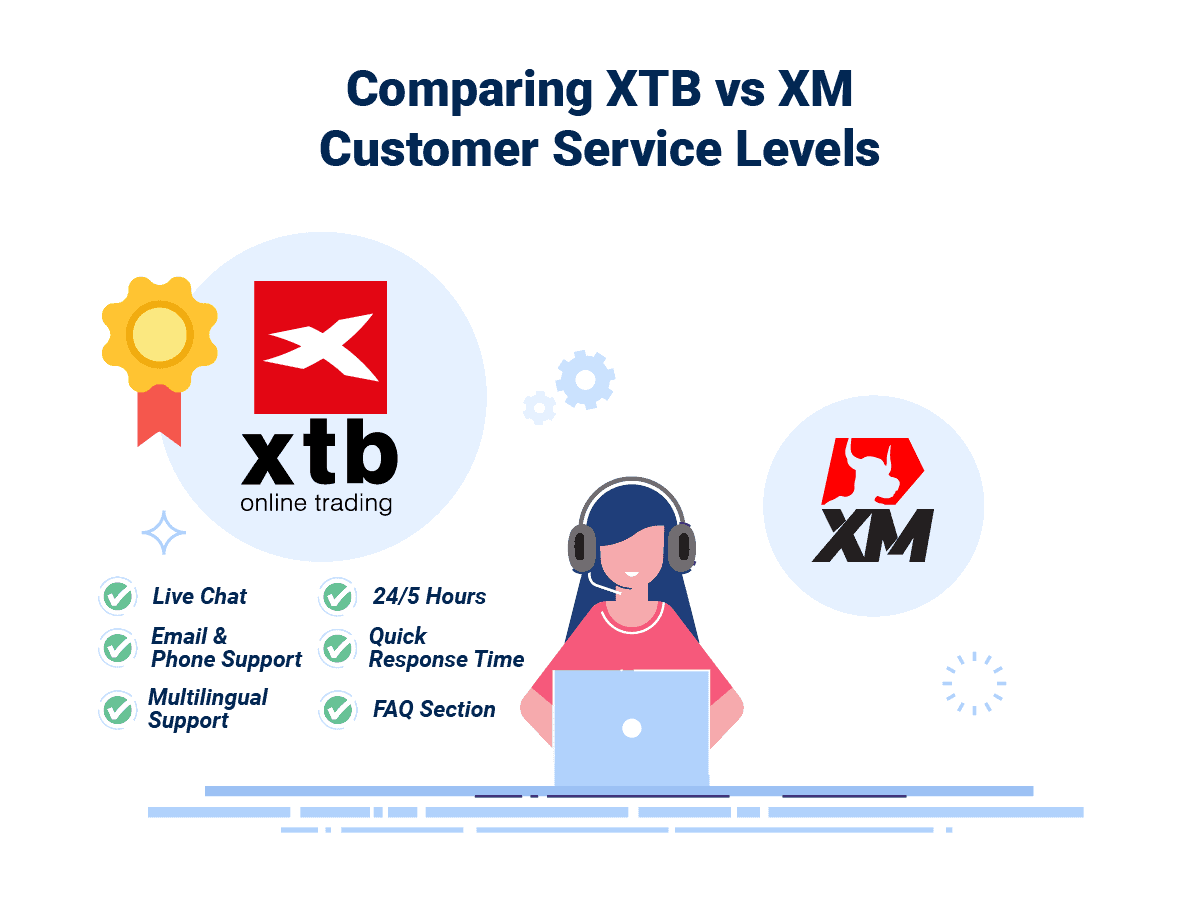
| Feature | XTB | XM |
|---|---|---|
| Live Chat Support | Yes | Yes |
| Email Support | Yes | Yes |
| Phone Support | Yes | Yes |
| Support Hours | 12/5 | 24/7 |
| Multilingual Support | Yes | Yes |
Our Superior Customer Service Verdict
XTB wins this section due to its dedicated account manager and comprehensive educational resources.
*Your capital is at risk ‘72% of retail CFD accounts lose money’
10. Better Funding Options: XTB
When it comes to funding options, both XTB and XM offer a range of methods to suit different needs. From our testing and the information on the page, here’s what we found:
XTB offers a variety of funding options, including credit/debit cards, bank transfers, and e-wallets such as PayPal and Skrill. XM also offers a range of funding options, including credit/debit cards, bank transfers, and e-wallets such as Neteller and Skrill. Both brokers have a minimum deposit requirement, with XTB’s starting at $250 and XM’s starting at $5.
| Funding Methods | XTB | XM |
|---|---|---|
| Credit Card | Yes | Yes |
| Debit Card | Yes | Yes |
| Bank Transfer | Yes | Yes |
| PayPal | Yes | No |
| Skrill | Yes | Yes |
| Neteller | Yes | Yes |
| Crypto | Yes | Yes |
| Rapid Pay | No | No |
| POLi / bPay | No | Yes |
| Klarna | No | No |
Our Better Funding Options Verdict
XTB offers the best funding options, with a wider range of methods available to suit different needs.
*Your capital is at risk ‘72% of retail CFD accounts lose money’
11. Lower Minimum Deposit: XTB
When it comes to starting your trading journey, the minimum deposit required by the broker can be a significant factor. From our testing and the information on the page, XTB and XM have different approaches to this. XTB has a standard account with a $0 minimum deposit, making it an attractive option for those who want to start small. On the other hand, XM offers a range of account types, including Standard, Micro, and XM Ultra Low, all with a minimum deposit of $5.
| Broker | Minimum Deposit | Recommended Deposit |
| XTB | $0 | $250 |
| XM | $5 | $5 |
In conclusion, both brokers offer low minimum deposit options, but XTB takes the lead with its $0 minimum deposit for a standard account. This makes it an excellent choice for those who are new to trading or want to test the waters without committing a significant amount of money.
Our Lower Minimum Deposit Verdict
XTB offers a lower minimum deposit, making it the better option for those looking to start trading with a smaller amount of capital.
*Your capital is at risk ‘72% of retail CFD accounts lose money’
Our Final Verdict On Which Broker Is The Best: XM or XTB?
XTB is the winner because it excels in most of the key areas that are important to traders, such as lower spreads and fees, a strong trust and regulation, a top product range and CFD markets, superior educational resources, superior customer service, better funding options, and a lower minimum deposit. The table below summarises the key information leading to this verdict.
| Criteria | XTB | XM |
|---|---|---|
| Lowest Spreads And Fees | ✅ | ❌ |
| Better Trading Platform | ❌ | ✅ |
| Superior Accounts And Features | ❌ | ✅ |
| Best Trading Experience And Ease | ✅ | ❌ |
| Stronger Trust And Regulation | ✅ | ❌ |
| Top Product Range And CFD Markets | ✅ | ❌ |
| Superior Educational Resources | ✅ | ❌ |
| Superior Customer Service | ✅ | ❌ |
| Better Funding Options | ✅ | ❌ |
| Lower Minimum Deposit | ✅ | ❌ |
Best For Beginner Traders
XTB is the better option for beginner traders due to its lower minimum deposit, superior educational resources, and superior customer service.
Best For Experienced Traders
XM is the better option for experienced traders due to its superior trading platform and superior accounts and features.
FAQs Comparing XTB Vs XM
Does XM or XTB Have Lower Costs?
XTB has lower costs. XTB offers competitive spreads starting from 0.1 pips, while XM’s spreads start from 0.6 pips. XTB’s average EUR/USD spread is 0.8 pips, while XM’s is 1.7 pips. For more information, check out our lowest spread forex brokers.
Which Broker Is Better For MetaTrader 4?
Both XTB and XM offer MetaTrader 4, but XM has a slight edge due to its additional features and tools. XM provides a range of MT4 account types, including Micro, Standard, and XM Ultra Low. For more details, visit our best MT4 forex brokers.
Which Broker Offers Social Trading?
XM offers social trading, while XTB does not. XM provides access to social trading features through its MetaTrader platforms, allowing traders to copy the trades of successful traders. For more information on social trading platforms, check out our best copy trading platforms.
Does Either Broker Offer Spread Betting?
Neither XTB nor XM offers spread betting. Spread betting is a form of trading that is popular in the UK and Ireland, but it is not available with these brokers. For more information on spread betting brokers, check out our best spread betting brokers.
What Broker is Superior For Australian Forex Traders?
In my opinion, XTB is superior for Australian Forex traders. XTB is regulated by ASIC, which is a major regulatory body in Australia. XTB offers a wide range of trading instruments and has a user-friendly platform. For more information on Australian Forex brokers, visit our Best Forex Brokers In Australia page.
What Broker is Superior For UK Forex Traders?
In my opinion, XTB is superior for UK Forex traders. XTB is regulated by the FCA, which is a major regulatory body in the UK. XTB offers a wide range of trading instruments and has a user-friendly platform. For more information on UK Forex brokers, visit our Best Forex Brokers In UK page.
Noam Korbl
Noam Korbl is the co-founder and has been a trader since 2014. He has Finance degree at Monash University and is an investor in shares and equities and successfully started and sold the online business Hearing Choices.



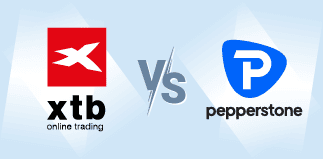
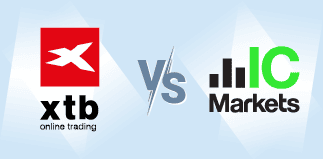
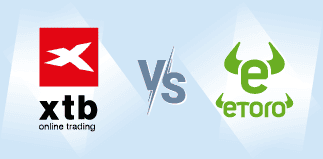
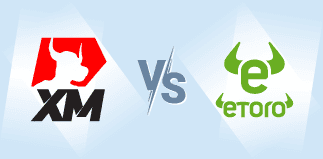
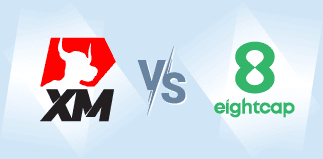
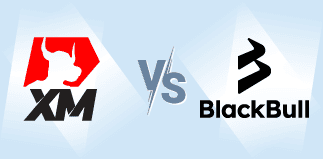
Ask an Expert
What currencies can I use in XTB account?
You can use several base currencies, including USD, EUR, and GBP, in your XTB account. Depending on your region, additional currencies like PLN (Polish Zloty) might be available. Take note that it is not possible to change the currency in which your trading account is held. However, you can have up to 4 trading accounts in different currencies.